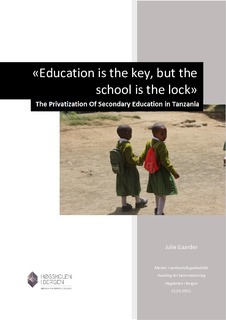| dc.contributor.author | Gaarder, Julie | |
| dc.date.accessioned | 2018-02-01T14:55:09Z | |
| dc.date.available | 2018-02-01T14:55:09Z | |
| dc.date.issued | 2015-05-15 | |
| dc.identifier.uri | http://hdl.handle.net/11250/2481570 | |
| dc.description | Masteroppgave i samfunnsfagsdidaktikk | en_GB |
| dc.description.abstract | This thesis discusses the phenomenon of privatization of secondary education in Tanzania, as well as the idea of economic development through education. The total number of private secondary schools has in fact almost tripled between 2006 and 2013. In accordance with the Education Gospel, education is as a prerequisite for poverty reduction and economic development. However, education’s developmental effects can only be expected to be dramatic if they are a part of a broader transformation. One has also started to realize that quantity has been prioritized at the cost of quality. The government schools have a high teacher-student-ratio, as well as a lack of both facilities, teaching materials and qualified teachers. Teachers’ motivation is also low due to the transfer issue and unsatisfactory salaries. This situation, in addition to the Tanzanian history where liberalization and privatization was practically forced on the country by the World Bank and the International Monetary Fund, as well as the country’s less fortunate financial situation, has led to private participants including themselves in the provision of education. Private schools shows a great diversity, and I found that even though their owners’ motivation seems to be a combination of making profit and doing good, schools owned by companies are more often profit driven as opposed to the schools with individual owners who seems to have more of an altruistic motivation. Regardless of the school owner’s motivation, the empirical evidence suggests that the privatization of education will continue, however not without consequences. Although a few manages to escape the bottom of the status hierarchy, privatization of education can also be considered as just a more sophisticated way of reproducing traditional distinctions between different types of schools and the people who attend them. Furthermore, the knowledge-based economy, which seems to be a goal of private school developers, gives education a role that is clearly reflected in the Education Gospel and the new global agenda. It gives both new responsibilities, priorities and functions to the educational system, and the agenda is clearly set in the name of globalizatio | en_GB |
| dc.description.abstract | Denne masteroppgaven drøfter privatiseringen av ungdoms- og videregående skoler i Tanzania, samt ideen om økonomisk utvikling gjennom utdanning. Antallet private ungdoms- og videregående skoler har nemlig nesten tredoblet seg mellom 2006 og 2013. Ifølge utdanningsortodoksien er utdanning en forutsetning for fattigdomsreduksjon og økonomisk utvikling. Utdanningens utviklingseffekt kan imidlertid kun forventes å være dramatisk dersom den er en del av en større transformasjon. Etter hvert han man også innsett at kvantitet har blitt prioritert på bekostning av kvalitet. De offentlige skolene er preget av en høy lærer-elev-rate og mangel på både fasiliteter, undervisningsmateriell og kvalifiserte lærere. Lærernes motivasjon er også lav på grunn av frykten for å bli forflyttet, samt et utilfredsstillende lønnsnivå. Denne situasjonen har ført til at private aktører har inkludert seg selv som tilbydere av utdanning, men det finnes også flere forklaringer. Privatiseringsutviklingen skyldes også liberaliseringen som praktisk talt ble påtvunget Tanzania av Verdensbanken og det internasjonale pengefondet på grunn av landets uheldige økonomiske situasjon. De private skolene er veldig ulik hverandre både i størrelse, organisering og ressurser, og skoleeiernes motivasjon for opprettelsen synes å være en blanding av ønsket om økonomisk gevinst og ønsket om å gjøre noe godt. Skoler eid av selskaper viser seg imidlertid å være motivert av profitt i betydelig større grad enn skolene eid av enkeltindivider. Disse individene synes i hovedsak å motiveres av ønsket om å gjøre noe godt. Uavhengig av skoleeiernes motivasjon tyder de empiriske dataene på at privatiseringen av utdanning vil fortsette, men ikke uten konsekvenser. Selv om noen få klarer å unnslippe bunnen av samfunnshierarkiet, kan privatisering også betraktes som en mer sofistikert måte å reprodusere de tradisjonelle skillene mellom ulike typer skoler og menneskene som befinner seg der. Den kunnskapsbaserte økonomien, som mange av de private skolene synes å strebe etter, gir også utdanning en rolle som er tydelig preget av utdanningsortodoksien og den nye globale agendaen. Rollen gir utdanningssystemet både nye ansvarsområder, prioriteringer og funksjoner, og agendaen er tydelig satt i globaliseringens navn. | en_GB |
| dc.language.iso | eng | en_GB |
| dc.publisher | Høgskolen i Bergen | en_GB |
| dc.subject.other | Tanzania | en_GB |
| dc.subject.other | privatisering | en_GB |
| dc.subject.other | vidergående skole | en_GB |
| dc.subject.other | ungdomsskole | en_GB |
| dc.subject.other | utdanning | en_GB |
| dc.title | Education is the key, but the school is the lock. | en_GB |
| dc.type | Master thesis | en_GB |
